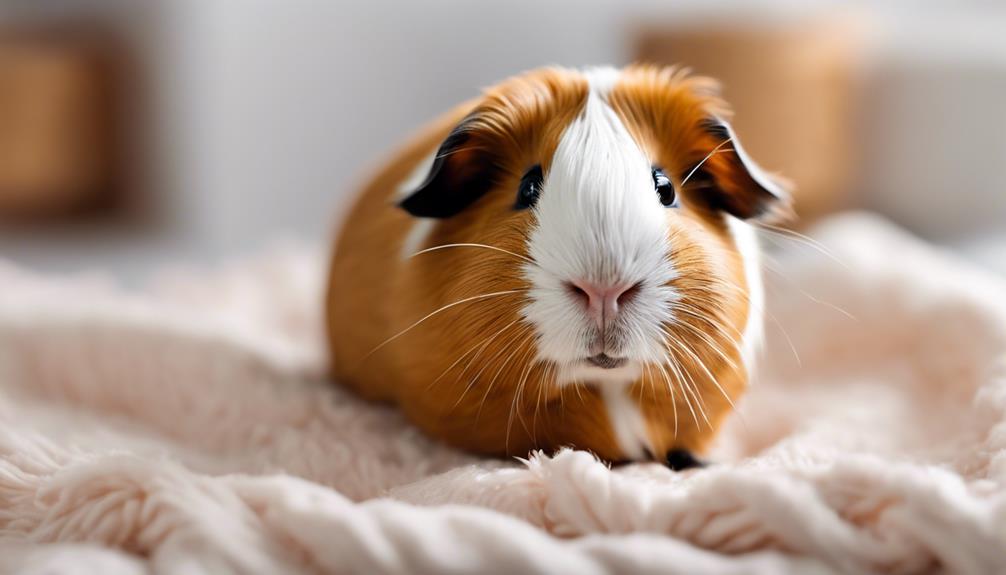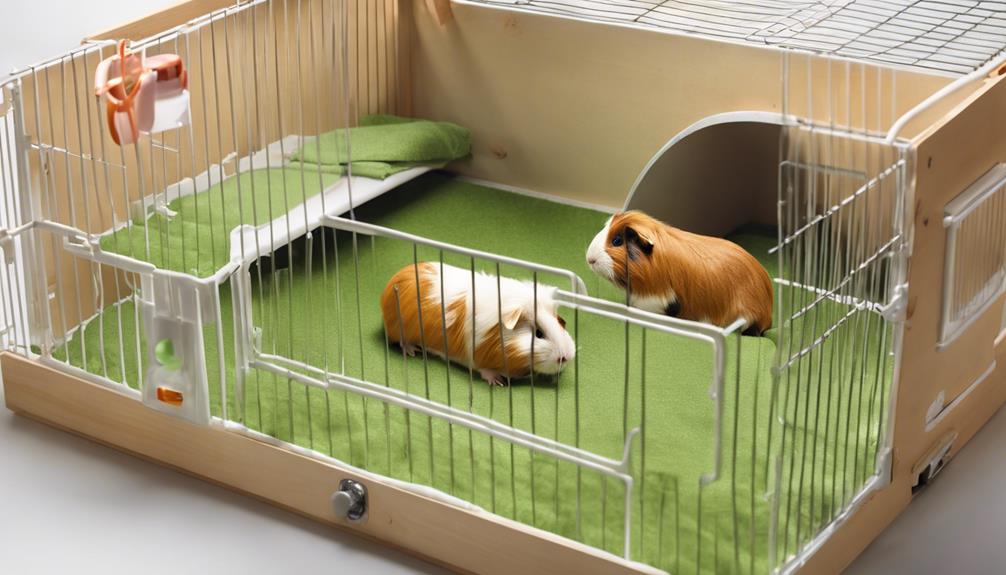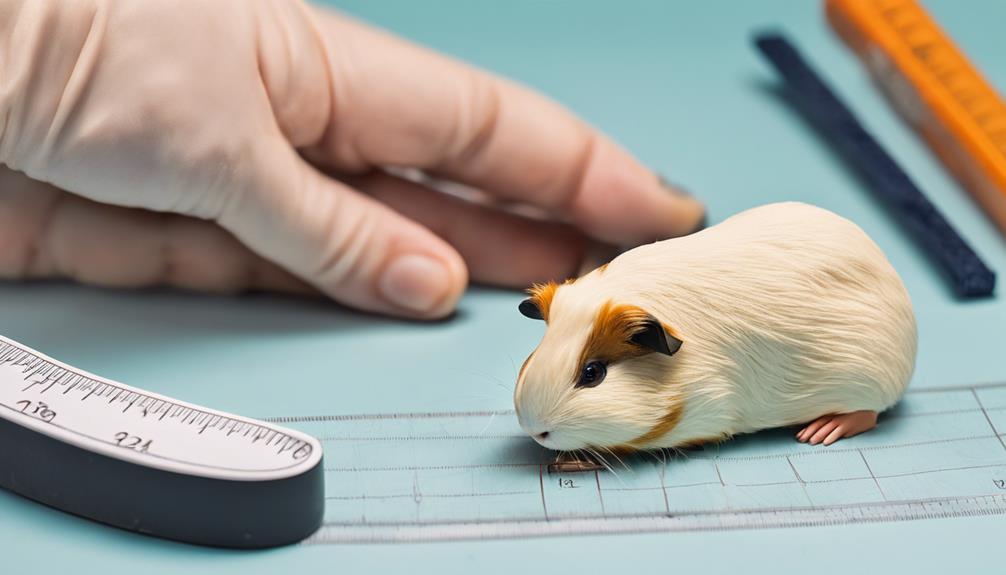How to Treat and Prevent Guinea Pig Foot Sores

Guinea pigs are prone to developing foot sores due to their sensitive skin and the pressure exerted on their feet. It is essential to provide a clean and comfortable living environment for your pet to prevent foot sores. Regularly clean the cage and bedding to avoid bacterial infections. Additionally, ensure that your guinea pig has a proper diet to maintain overall health, which can also contribute to preventing foot sores. If your pet already has foot sores, consult a veterinarian for appropriate treatment, which may include cleaning the wound, applying ointments, and providing pain relief. Regularly check your guinea pig's feet for any signs of sores or irritation to address them promptly and ensure your pet's well-being.
Key Takeaways
- Maintain clean bedding and flooring to prevent foot sores.
- Provide a spacious cage and balanced diet for guinea pigs.
- Regularly monitor for signs of foot sores and seek veterinary care.
- Implement preventive measures like daily foot inspections and exercise.
Understanding Guinea Pig Foot Sores
Guinea pig foot sores, also known as bumblefoot, can be a painful and potentially serious condition for these small pets. To prevent infections and keep your guinea pig's feet healthy, it's essential to follow proper grooming techniques. Regularly check your guinea pig's feet for any signs of redness, swelling, or sores. Keep their living area clean and dry to avoid bacteria buildup that can lead to bumblefoot.
When grooming your guinea pig, pay special attention to their feet. Trim their nails regularly to prevent overgrowth, which can cause discomfort and lead to foot problems. Additionally, make sure that their bedding is soft and clean to reduce the risk of injuries to their delicate feet.
Identifying Signs and Symptoms
To guarantee the well-being of guinea pigs, recognizing the signs and symptoms of foot sores is vital. Understanding what to look for, such as changes in behavior or visible wounds, can aid in early detection and swift intervention.
Signs of Sores
When observing your guinea pig for signs of foot sores, pay close attention to any changes in their movement or behavior. Early detection is important for effective treatment. Signs of foot sores in guinea pigs may include limping, favoring one foot, reluctance to move, redness or swelling on the feet, and overgrown or misshapen nails. It is vital to act promptly if you notice any of these symptoms to prevent further discomfort or complications for your furry friend. Below is a table summarizing prevention tips and treatment options for guinea pig foot sores:
| Prevention Tips | Treatment Options |
|---|---|
| Provide a clean living environment | Consult a veterinarian for proper care |
| Ensure proper cage bedding | Administer prescribed medication |
| Regularly trim their nails | Keep affected area clean and dry |
| Encourage exercise and play | Use protective boots if necessary |
Symptoms to Watch
Detecting foot sores in your guinea pig involves closely monitoring any changes in their movement or behavior, as early recognition is important for effective treatment. Keep an eye out for these symptoms to catch any issues early on:
- Limping or favoring one foot
- Redness, swelling, or tenderness on the feet
- Unwillingness to walk or exercise
- Excessive licking or grooming of the affected area
Prevention tips include providing a clean living environment, regular nail trims, and a balanced diet. Treatment options may involve veterinary care, topical ointments, and adjusting the guinea pig's living conditions.
Early Detection Tips
Keep a keen eye on your guinea pig's behavior and movements for any subtle changes that may indicate the presence of foot sores. Early detection is key to preventing further discomfort for your furry friend. Look out for signs such as limping, favoring one foot, redness, swelling, or reluctance to move. Swift action through prevention methods and early intervention can make a significant difference in your guinea pig's foot health. Here are some foot sore management and care tips to help you provide the best possible care for your pet:
| Prevention Methods | Early Intervention | Foot Sore Management |
|---|---|---|
| Regular cage cleaning | Prompt vet consultation | Proper bedding choice |
| Balanced diet | Adjusting cage layout | Regular foot checks |
| Providing a spacious living environment | Implementing foot care routine | Gentle cleaning of affected areas |
Providing Proper Bedding and Flooring
To guarantee guinea pigs' comfort and prevent foot sores, it's essential to provide suitable bedding materials and flooring considerations.
The right bedding will offer cushioning and absorbency, while the flooring should be smooth and gentle on their delicate feet.
Suitable Bedding Materials
Selecting appropriate bedding materials is essential for providing comfort and preventing foot sores in guinea pigs. When choosing bedding for your furry friends, consider the following:
- Bedding Options: Opt for soft materials like paper-based bedding or aspen shavings to cushion your guinea pig's delicate feet.
- Comfort: Guarantee the bedding is soft and absorbent to keep your pet cozy and dry.
- Cleaning Frequency: Regularly clean and change the bedding to maintain cleanliness and prevent bacterial growth.
- Odor Control: Choose bedding that helps control odors to keep your guinea pig's living environment fresh and pleasant.
Flooring Considerations
For best comfort and foot health in guinea pigs, the selection of suitable bedding and flooring is essential. When considering flooring for your guinea pig's habitat, opt for materials that are gentle on their sensitive feet. Soft bedding such as fleece or paper-based options can provide a comfortable surface for your furry friend to walk on.
Avoid wire-bottomed cages, as they can cause foot sores and discomfort. Providing cage accessories like hideouts and tunnels can also offer additional padding and enrichment for your guinea pig while promoting healthy foot care.
Ensuring Proper Cage Size and Maintenance

Ensuring the guinea pig's health and comfort begins with providing a spacious and well-maintained cage. Here are some essential tips to help you maintain an ideal living environment for your furry friend:
- Cage Size: Guarantee the cage is large enough to allow for ample movement and exercise. Guinea pigs are active animals and need space to roam and play freely.
- Cage Enrichment: Include toys, tunnels, and hiding spots to stimulate your guinea pig's mind and encourage physical activity. A stimulated guinea pig is a happy and healthy one.
- Proper Socialization: Guinea pigs are social creatures and thrive in the company of their kind. Consider providing companionship to prevent loneliness and promote mental well-being.
- Regular Maintenance: Clean the cage regularly to ensure a hygienic environment. Remove any wet bedding, uneaten food, and droppings promptly to prevent the build-up of bacteria and odors.
Implementing Regular Hygiene Practices
To maintain the well-being of your guinea pig, prioritize implementing regular hygiene practices in their living environment. Foot sore prevention is closely linked to cleanliness, making hygiene habits essential for your furry companion's health.
Start by spot-cleaning your guinea pig's living space daily, removing any wet bedding, droppings, or uneaten food to prevent the growth of bacteria that could lead to foot sores. Regularly change the bedding to maintain a dry and clean environment, reducing the risk of infections.
Additionally, guarantee that the cage is well-ventilated to prevent moisture buildup, which can also contribute to foot problems. By incorporating these simple yet essential hygiene practices into your routine, you're actively taking steps to safeguard your guinea pig's well-being and prevent potential foot sores.
Offering a Balanced Diet and Nutrition

Nourishing your guinea pig with a balanced diet rich in essential nutrients is paramount for their overall health and well-being. Ensuring they receive the right combination of vitamins, minerals, and fiber is vital in preventing foot sores and maintaining their vitality. Here are some key points to bear in mind:
- Dietary Supplements: Guinea pigs may benefit from additional vitamin C supplements to support their immune system and prevent deficiencies.
- Exercise Routine: Encouraging your guinea pig to stay active through playtime and providing opportunities for movement can aid in weight management and overall well-being.
- Vitamin Deficiencies: Keep an eye out for signs of deficiencies such as scurvy, which can manifest as lethargy and rough coat, and adjust their diet accordingly.
- Weight Management: Maintaining a healthy weight through proper diet and exercise is essential in preventing various health issues, including foot sores.
Consulting With a Veterinarian
Maintaining a close relationship with a knowledgeable veterinarian can provide valuable guidance on your guinea pig's health and help address any concerns promptly. When dealing with foot sores in guinea pigs, seeking veterinary care is essential. A professional veterinarian can offer tailored treatment options and preventative measures based on your guinea pig's specific condition.
Veterinarians are well-equipped to provide professional advice on how to effectively treat existing foot sores and prevent future occurrences. They can recommend suitable medications, wound care techniques, and adjustments to the guinea pig's environment to promote healing and avoid further complications. Additionally, regular check-ups with a veterinarian can help monitor your pet's progress and make sure that the treatment plan remains effective.
Monitoring and Preventive Measures

By regularly monitoring your guinea pig's foot health and implementing preventive measures, you can safeguard against potential foot sores and promote overall well-being. Here are some essential tips to help you maintain your furry friend's paw health:
- Regular Inspection: Check your guinea pig's feet daily for any signs of redness, swelling, or cuts.
- Make sure the bedding in your guinea pig's enclosure is soft and clean to prevent irritation and pressure sores.
- Healthy Diet: Provide your guinea pig with a balanced diet rich in Vitamin C to support overall health and immune function.
- Encourage your guinea pig to exercise regularly to prevent obesity and improve circulation, which can help prevent foot problems.
Frequently Asked Questions
Can Guinea Pig Foot Sores Be Contagious to Other Guinea Pigs in the Same Household?
Guinea pig foot sores can be contagious among other guinea pigs in the same household. Preventing transmission involves maintaining good household hygiene, separate living quarters, and regular foot checks. Diligent care is key to preventing spread.
Are There Any Specific Toys or Accessories That Can Help Prevent Foot Sores in Guinea Pigs?
To help prevent foot sores in guinea pigs, providing soft bedding like fleece or towels can cushion their delicate feet. Also, offering toys like tunnels or hideouts encourages exercise and keeps them engaged.
Can Guinea Pig Foot Sores Be Caused by Environmental Factors Such as Temperature or Humidity?
Guinea pig foot sores can indeed be influenced by environmental factors like temperature and humidity. Maintaining proper temperature regulation and humidity levels can help prevent these issues. Choosing suitable bedding options and flooring is essential for their well-being.
How Often Should Guinea Pig Cages Be Thoroughly Cleaned to Prevent Foot Sores?
To keep guinea pigs happy and healthy, cages should be cleaned diligently. A thorough cleaning every 3-4 days is ideal. Opt for soft bedding, a spacious cage, and consider fleece liners for comfort and cleanliness.
Are There Any Alternative Treatments or Remedies for Guinea Pig Foot Sores Besides Consulting With a Veterinarian?
When seeking alternative relief for guinea pig foot sores, exploring natural remedies and home treatments can offer comfort. Ensuring a balanced diet and providing ample exercise are simple yet effective ways to promote healing and prevent future issues.











